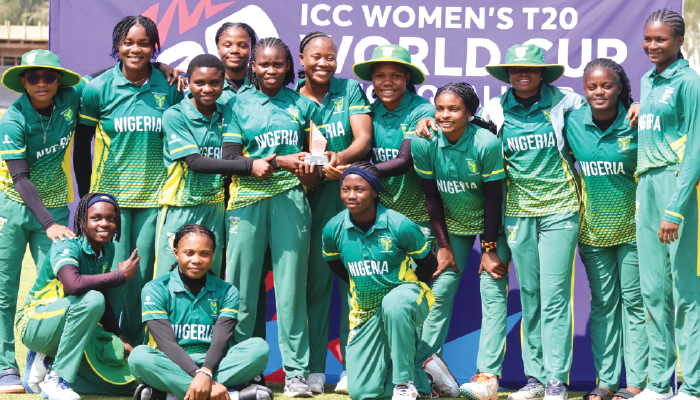Nigeria’s journey in the ICC Women’s T20 World Cup Africa Division 1 Qualifier encountered a significant roadblock on Monday as they suffered a resounding eight-wicket defeat against host nation Namibia in their second group match. This setback followed an impressive opening victory against Sierra Leone, where the Nigerian team, affectionately known as the Female Yellow Greens, showcased their prowess with a commanding 96-run triumph. The match against Namibia, however, unfolded quite differently, exposing vulnerabilities in the Nigerian side, particularly in their bowling department.
The Nigerian innings commenced with a sense of promise, yet the team struggled to build momentum against a disciplined Namibian bowling attack. The top-order batswomen, Salome Sunday, Oseyande Omonkhobhio, and Kehinde Amusa, made valuable contributions, scoring 22, 14, and 12 runs respectively. However, the rest of the batting order failed to capitalize on these starts, succumbing to the consistent pressure exerted by the Namibian bowlers. Saima Tahaduleni spearheaded the Namibian bowling effort with an impressive three-wicket haul, conceding only 13 runs. Kayleen Green and Mekelanye Mwatile further tightened the screws, each claiming two wickets and contributing significantly to restricting the Nigerian team to a modest total of 70 runs in 18.4 overs.
Namibia’s chase of the target was a display of dominance, characterized by a powerful and controlled approach. Yasmeen Khan orchestrated the pursuit with a blistering 51 runs off just 30 balls, an innings studded with boundaries and displaying aggressive intent. Her partnership with Kayleen Green, who contributed a steady 15 runs, ensured a swift and comfortable victory for the hosts. Nigeria managed to secure two wickets, with Kehinde Amusa and Lilian Ude claiming one wicket each. However, the Namibian team reached the target of 71 runs in a mere 9.5 overs, securing a comprehensive eight-wicket win and inflicting Nigeria’s first defeat of the tournament.
Despite the loss, Nigeria remained in contention for a semi-final spot, occupying the second position in the group standings with two points. Zimbabwe held the top spot, boasting four points after securing victories against both Namibia and Sierra Leone. This set the stage for a crucial encounter between Nigeria and Zimbabwe in the final group game, a match that would effectively determine the group leader and significantly influence the semi-final matchups.
The ICC Women’s T20 World Cup Africa Division 1 Qualifier serves as a stepping stone towards the global qualifying stage of the T20 World Cup, a prestigious event on the international cricketing calendar. The top two teams from each group in the Africa Division 1 Qualifier will advance to the semi-finals, and the two finalists will secure the coveted spots representing Africa in the subsequent global qualifying tournament. This adds immense significance to each match in the qualifier, as teams vie for the opportunity to progress further in the competition and ultimately compete on the world stage.
Nigeria’s loss to Namibia undoubtedly dealt a blow to their campaign, exposing areas requiring improvement, particularly in their bowling and middle-order batting. The match highlighted the importance of maintaining consistent pressure throughout the innings, both with the bat and ball, and the need to adapt effectively to varying match situations. The upcoming encounter against Zimbabwe presented a crucial test for the Nigerian team, requiring them to regroup, address their shortcomings, and deliver a strong performance to secure their place in the semi-finals.
The match against Zimbabwe loomed as a virtual decider, promising a thrilling contest between two strong teams vying for supremacy in Group A. The outcome of this match would not only determine the group leader but also significantly impact the semi-final pairings, adding an extra layer of intrigue to the already high-stakes competition. Nigeria’s performance in this crucial encounter would be a testament to their resilience and adaptability, and a measure of their ability to rise to the challenge when it mattered most. The path to the global qualifiers remained open, but the Female Yellow Greens would need to summon their best cricket to overcome the formidable challenge posed by Zimbabwe and secure their progression in the tournament.


